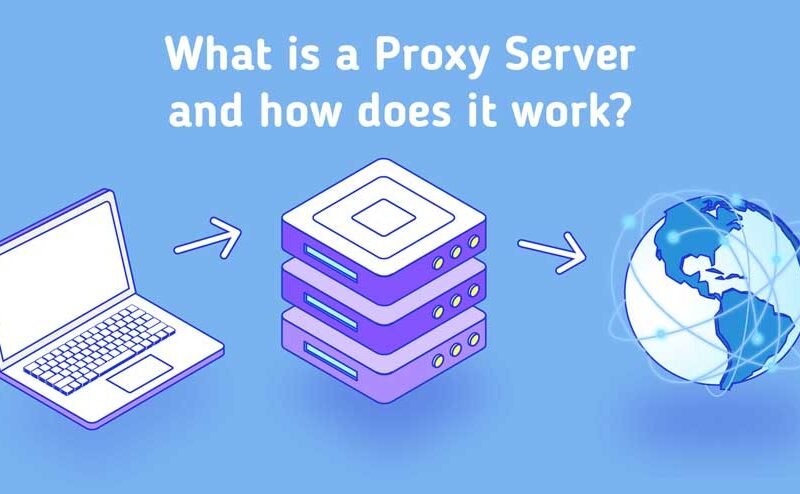Do you have to need to hide your online identity, access forbidden sites, or secure your browsing? Well then, you might have heard of the term “proxy server in passing. But what is a proxy server, and why do you have to be aware of it in your daily internet browsing?
What Is a Proxy Server?
A proxy server is an intermediary server that goes between your device and the websites you access. It is a middleman in the sense that it takes the requests you make to the internet and forwards them to the correct place. The main characteristic of a proxy is that it conceals your true IP address, substituting it with its own.
If you have a proxy, websites and services you come across will notice the IP address of the proxy and not your own. This prevents your privacy from being compromised through your real location and identity being masked. Proxy servers are frequently used due to privacy, security, or performance needs, and can be effectively used in order to bypass geographical restrictions.
How Do Proxy Servers Work?
When you set up a proxy server, you set it up to direct your internet traffic. Here is a simple overview of the process:
- Your Request: You make a request when you wish to access a website using your browser.
- Proxy Intercept: The request is initially sent to the proxy server instead of proceeding directly to the site.
- Forwarding the Request: The proxy server directs the request to the target website on your behalf.
- Website Response: The website responds with its answer to the proxy server.
- Sending Back to You: The proxy server sends the response of the website to you, ending the process.
Since the site is communicating directly with the proxy, your actual IP address and location are not visible to it. Not only does this preserve your anonymity, but it also provides an added layer of protection, as the proxy server can screen out malicious content or block undesirable sites.
Main Types of Proxy Servers
Proxy servers exist in different forms, each designed to meet different purposes. Below are the main types you should know of:
- HTTP Proxy Servers: These are the most popular form of proxies for internet surfing. They support HTTP and HTTPS traffic, letting you surf the web without exposing your IP address. They, however, do not function for other forms of traffic, such as email or file transfers.
- SOCKS Proxy Servers: SOCKS proxies are more universal than HTTP proxies. They can support a lot of different internet traffic, such as email, torrents, and even gaming. SOCKS proxies do not manipulate your data, making them a bit more secure but maybe slower.
- Transparent Proxy Servers: As the name indicates, transparent proxies do not mask your IP address. They are used in schools, companies, and public networks for content filtering, monitoring, as well as implementing internet policies. They provide less privacy than other forms.
- Anonymous Proxy Servers: These proxies hide your IP address but still present themselves as proxies. They are less private than elite proxies, but acceptable for browsing without exposing too much of your real identity.
- Elite Proxy Servers: Elite proxies provide the greatest anonymity. They do not identify themselves as proxies and do not give away your original IP address to the websites you browse. They are perfect for those who require utmost privacy.
- Residential Proxy Servers: These proxies use actual IP addresses of Internet Service Providers (ISPs), so they will be less likely to be detected or blocked by websites. Residential proxies are generally used for work such as web scraping or viewing geo-blocked content.
Why Proxy Servers Matter
Proxy servers matter for a variety of reasons, especially online privacy and security. Here is why they are so important:
- Privacy Protection: One of the most significant reasons for using a proxy is to guard your privacy. A proxy conceals your original IP address, making it extremely difficult for sites to monitor your browsing history, sponsor you with advertisements, or harvest your personal details.
- Bypass Geo-Restrictions: Several streaming websites, sites, and online content are geographically restricted. Using a proxy, you can make it seem like you are accessing from another country, allowing you to access content that may be unavailable in your location.
- Improved Security: Proxies can serve as a firewall between your computer and potentially malicious websites. Certain proxies can prevent harmful websites or screen out malicious content, providing an added layer of security to browsing.
- Enhanced Performance: Some proxy servers, especially caching proxies, enhance browsing speed by keeping cached copies of highly visited web pages. That is, rather than asking the page on the site every time, the proxy provides it from its cache, which shortens the time to load.
- Access to Blocked Networks: If you find yourself in a network where access to the internet is forbidden (like in some schools or companies), proxies will allow you to access blocked material by routing your traffic via a server that is not blocked in the same way.
If you are thinking of using proxy servers to enhance your privacy or performance when you are online, check out Travchis Proxies for further information about how proxies might be able to help you.
How to Choose the Right Proxy for You
Choosing the best proxy involves examining a few points:
- Purpose: Knowing the reason behind your need for a proxy is important. Are you interested in improving privacy, breaking geo-blocks, or just in need of getting more security? Your proxy type is determined by the purpose you want to use for your proxy.
- Speed and Reliability: Some proxies are likely to slow your browsing speed, so you should pick a reputable provider that can serve your needs with high-speed servers. This is most important when you wish to stream live content or are engaged in the downloading of heavy files.
- Security: Choose those proxies that have built-in encryption and security features, especially when you are connecting to public Wi-Fi or dealing with sensitive information.
- Cost: Even though free proxies are attractive to you, they will be limited in terms of performance and security features. The drawback of free proxies is reduced speed and a decrease in the security level, on the other hand, the paid version will guarantee you better performance and round-the-clock customer service.
By considering these things, you can choose a proper proxy that will meet all your requirements and provide you with good service.
Final Thoughts
From a more general view, a proxy server is an important resource for anyone wanting to protect themselves from privacy infringements, boost online security by proxying their real IP address, and unblock otherwise inaccessible web content. If you are in need of being undetected while browsing, are interested in geographically restricted content, or simply looking for a faster connection, a proxy will help you in reaching your goals.










